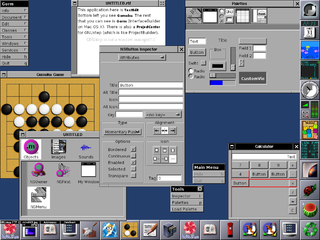An integrated development environment (IDE) is a software application that provides comprehensive facilities for software development. An IDE normally consists of at least a source-code editor, build automation tools, and a debugger. Some IDEs, such as IntelliJ IDEA, Eclipse and Lazarus contain the necessary compiler, interpreter or both; others, such as SharpDevelop and NetBeans, do not.

A text editor is a type of computer program that edits plain text. An example of such program is "notepad" software. Text editors are provided with operating systems and software development packages, and can be used to change files such as configuration files, documentation files and programming language source code.

GNUstep is a free software implementation of the Cocoa Objective-C frameworks, widget toolkit, and application development tools for Unix-like operating systems and Microsoft Windows. It is part of the GNU Project.

Genera is a commercial operating system and integrated development environment for Lisp machines created by Symbolics. It is essentially a fork of an earlier operating system originating on the Massachusetts Institute of Technology (MIT) AI Lab's Lisp machines which Symbolics had used in common with Lisp Machines, Inc. (LMI), and Texas Instruments (TI). Genera was also sold by Symbolics as Open Genera, which runs Genera on computers based on a Digital Equipment Corporation (DEC) Alpha processor using Tru64 UNIX. In 2021 a new version was released as Portable Genera which runs on Tru64 UNIX on Alpha, Linux on x86-64 and Arm64 Linux, and macOS on x86-64 and Arm64. It is released and licensed as proprietary software.

Damn Small Linux (DSL) is a computer operating system for the x86 family of personal computers. It is free and open-source software under the terms of the GNU GPL and other free and open-source licenses. It was designed to run graphical user interface applications on older PC hardware, for example, machines with 486 and early Pentium microprocessors and very little random-access memory (RAM). DSL is a live CD with a size of 50 megabytes (MB). What originally began as an experiment to see how much software could fit in 50 MB eventually became a full Linux distribution. It can be installed on storage media with small capacities, like bootable business cards, USB flash drives, various memory cards, and Zip drives.

Texinfo is a typesetting syntax used for generating documentation in both on-line and printed form with a single source file. It is implemented by a computer program released as free software of the same name, created and made available by the GNU Project from the Free Software Foundation.

CUPS is a modular printing system for Unix-like computer operating systems which allows a computer to act as a print server. A computer running CUPS is a host that can accept print jobs from client computers, process them, and send them to the appropriate printer.
Ctags is a programming tool that generates an index file of names found in source and header files of various programming languages to aid code comprehension. Depending on the language, functions, variables, class members, macros and so on may be indexed. These tags allow definitions to be quickly and easily located by a text editor, a code search engine, or other utility. Alternatively, there is also an output mode that generates a cross reference file, listing information about various names found in a set of language files in human-readable form.

JOE or Joe's Own Editor is an ncurses-based text editor for Unix systems, available under the GPL. It is designed to be easy to use.
In the field of computer network administration, pcap is an application programming interface (API) for capturing network traffic. While the name is an abbreviation of packet capture, that is not the API's proper name. Unix-like systems implement pcap in the libpcap library; for Windows, there is a port of libpcap named WinPcap that is no longer supported or developed, and a port named Npcap for Windows 7 and later that is still supported.
A personal wiki is wiki software that allows individual users to organize information on their desktop or mobile computing devices in a manner similar to community wikis, but without collaborative software or multiple users.

GNU Emacs is a text editor and suite of free software tools. Its development began in 1984 by GNU Project founder Richard Stallman, based on the Emacs editor developed for Unix operating systems. GNU Emacs has been a central component of the GNU project and a flagship project of the free software movement.
Emacs, originally named EMACS, is a family of text editors that are characterized by their extensibility. The manual for the most widely used variant, GNU Emacs, describes it as "the extensible, customizable, self-documenting, real-time display editor". Development of the first Emacs began in the mid-1970s, and work on GNU Emacs, directly descended from the original, is ongoing; its latest version is 29.4 , released June 2024.

Org Mode is a mode for document editing, formatting, and organizing within the free software text editor GNU Emacs and its derivatives, designed for notes, planning, and authoring. The name is used to encompass plain text files that include simple marks to indicate levels of a hierarchy, and an editor with functions that can read the markup and manipulate hierarchy elements.
Next3 is a journaling file system for Linux based on ext3 which adds snapshots support, yet retains compatibility to the ext3 on-disk format. Next3 is implemented as open-source software, licensed under the GPL license.
The following outline is provided as an overview of and topical guide to the Perl programming language:







